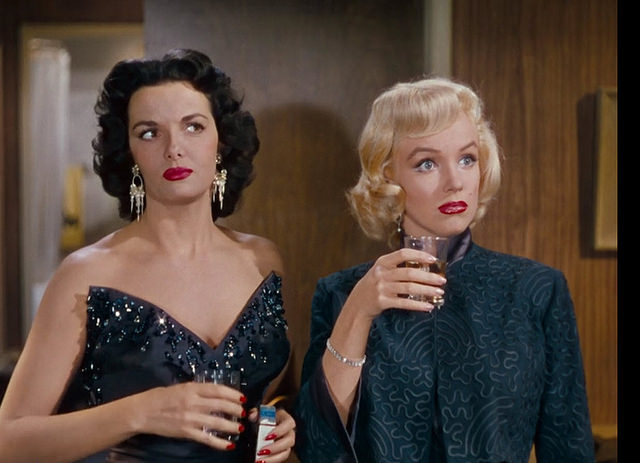When I noticed Hulu recently added the 1953 Marilyn Monroe classic, Gentlemen Prefers Blondes, I scoffed. While I find Monroe to be a complex and misunderstood icon (notably her friendship with Ella Fitzgerald and reported history of perhaps being lesbian-inclined), I tend to view the modern women who flock to her to be vapid and often full of internalized misogyny. It didn’t surprise me when I started seeing images of the movie pop up over my social media accounts decorated with hearts and #vibe.
The title itself gives the audience the assumption that the male gaze is the prevalent point of view in the film, and I assumed the movie would revolve around two women chasing men. However, I also figured that I should at least collect concrete information about the film that I classified as sexist and shallow before I ended up on a diatribe about it sans any real facts.
To my pleasant shock, Gentlemen Prefer Blondes is wildly feminist, which is extra impressive, seeing as the second wave wouldn’t hit for another seven years. The film is incredibly ahead of its time. The title is misleading; something like Two Broads Abroad or Masters Of Men would be more fitting. My initial hunch was correct: the film is mostly about two women chasing men. But it’s complex and hilarious, and not hilarious at the expense of the film’s two female leads.
Throughout the entire film, the main characters Lorelei (Marilyn Monroe) and Dorothy (Jane Russell) display consistent loyalty to one another. There is no back-stabbing, shit-talking, or degrading one another to come out on top or gain the affection of a man. The women remain steadfast in their loyalty to one another, and tolerate no one speaking ill of the other. Providing support and comfort to one another takes priority over finding ways to secure their desired men.
Lorelei and Dorothy are the makers and shakers throughout the film. They are the ones who make events happen; events are not happening to them. Often in film, women are on the receiving end of action, or stand adjacent to it, but here, the women act on their own desires and motives to move the action forward. They unabashedly chase the things they want—Monroe’s character is chasing money, and Russell’s character is chasing a poor man to love. It would be easy to reduce Monroe’s character to merely a gold-digger, but she is looking for power and access in a culture driven by money. She is upfront about her intentions, and does not let society’s thoughts about her behavior change her plan of action.
The women own their sexuality. They display a robust and unapologetic self-esteem. Lorelei and Dorothy practice femininity by dressing provocatively and flirting in a way that gives them access to men, sex, money, and adventure. They are using what they have in order to get ahead. It’s clear the two women know men get drop-jawed looking at them, and that’s exactly the reaction they are seeking. There isn’t a second when you don’t feel like both women have control over their situations. These are not victims of any kind.
Dorothy is the tell-it-like-it-is broad, à la Miranda Hobbs. She’s the original sarcastic, no-filter, female friend who will not settle for less than she deserves and isn’t afraid to tell others her opinion. Dorothy has no problem objectifying and lightly degrading men.
The film is full of sexual objectification of men, which is a powerful role reversal for 1953. In one scene, the entire men’s Olympic team dances around in speedos while the ladies openly ogle them—and then let the men get lost into the background like props. Both women spend time in the film sizing up men and objectifying them for their looks and money. Neither hides this objectification or apologizes for it.
Lorelei seems like the classic dumb blonde throughout, but she routinely gives the audience glimpses that this is merely an act. At one point, she blatantly states, “I can be smart when it’s important, but most men don’t like it,” so she’s literally giving men what they want as a means to an end. She’s the original Paris Hilton, laughing all the way to the bank with her one-zillion dollar empire while everyone speculates about her lack of intellect.
Many have noted that not one scene in the movie passes the Bechdel-Wallace test, which didn’t even exist until 1985, but it should be noted that passing the Bechdel test does not inherently make art feminist. Towards the end of the film, Lorelei’s boyfriend tells her that she needs to change if she wants to maintain their relationship. Without hesitation, she declares this is the women she is, and he can take her or leave her. I find it feminist to stick to yourself and motives, and not wilt due to the desires of men. Overall, Gentlemen Prefer Blondes is a surprisingly feminist, funny buddy comedy.
Top photo: Gentlemen Prefer Blondes, via Classic Film/Flickr Creative Commons
More from BUST
Movie Review | My Week With Marilyn
The Secret Lives Of The Ziegfeld Follies, “The Most Beautiful Girls In The World”


